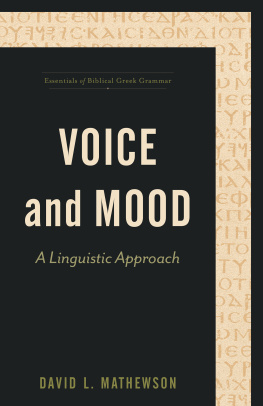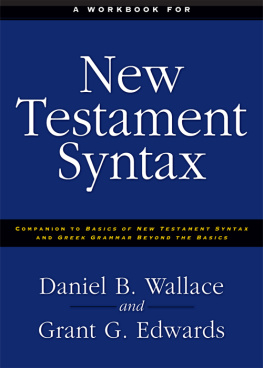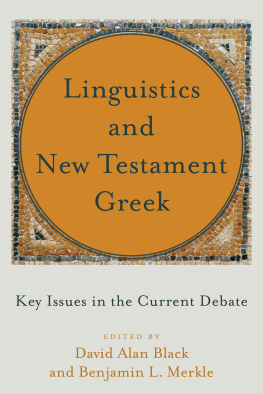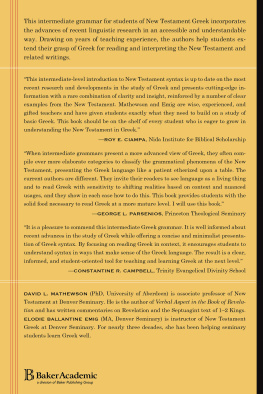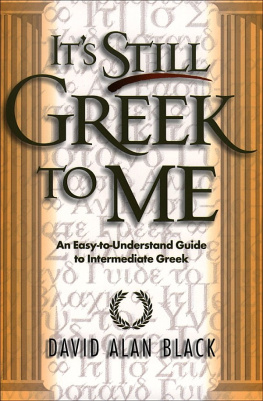David L. Mathewson - Voice and Mood: A Linguistic Approach
Here you can read online David L. Mathewson - Voice and Mood: A Linguistic Approach full text of the book (entire story) in english for free. Download pdf and epub, get meaning, cover and reviews about this ebook. year: 2021, publisher: Baker Publishing Group, genre: Home and family. Description of the work, (preface) as well as reviews are available. Best literature library LitArk.com created for fans of good reading and offers a wide selection of genres:
Romance novel
Science fiction
Adventure
Detective
Science
History
Home and family
Prose
Art
Politics
Computer
Non-fiction
Religion
Business
Children
Humor
Choose a favorite category and find really read worthwhile books. Enjoy immersion in the world of imagination, feel the emotions of the characters or learn something new for yourself, make an fascinating discovery.
- Book:Voice and Mood: A Linguistic Approach
- Author:
- Publisher:Baker Publishing Group
- Genre:
- Year:2021
- Rating:3 / 5
- Favourites:Add to favourites
- Your mark:
- 60
- 1
- 2
- 3
- 4
- 5
Voice and Mood: A Linguistic Approach: summary, description and annotation
We offer to read an annotation, description, summary or preface (depends on what the author of the book "Voice and Mood: A Linguistic Approach" wrote himself). If you haven't found the necessary information about the book — write in the comments, we will try to find it.
Voice and Mood: A Linguistic Approach — read online for free the complete book (whole text) full work
Below is the text of the book, divided by pages. System saving the place of the last page read, allows you to conveniently read the book "Voice and Mood: A Linguistic Approach" online for free, without having to search again every time where you left off. Put a bookmark, and you can go to the page where you finished reading at any time.
Font size:
Interval:
Bookmark:
Essentials of Biblical Greek Grammar
S TANLEY E. P ORTER , series editor
Voice and Mood: A Linguistic Approach by David L. Mathewson
2021 by David L. Mathewson
Published by Baker Academic
a division of Baker Publishing Group
PO Box 6287, Grand Rapids, MI 49516-6287
www.bakeracademic.com
Ebook edition created 2021
All rights reserved. No part of this publication may be reproduced, stored in a retrieval system, or transmitted in any form or by any meansfor example, electronic, photocopy, recordingwithout the prior written permission of the publisher. The only exception is brief quotations in printed reviews.
Library of Congress Cataloging-in-Publication Data is on file at the Library of Congress, Washington, DC.
ISBN 978-1-4934-2052-0
Unless otherwise indicated, Scripture translations are the authors own.
Unless otherwise indicated, quotations from the Greek New Testament come from Eberhard Nestle, Erwin Nestle, Barbara Aland, Kurt Aland, Johannes Karavidopoulos, Carlo M. Martini, and Bruce M. Metzger, eds. Novum Testamentum Graece . 28th rev. ed. Stuttgart: Deutsche Bibelgesellschaft, 2012.
Baker Publishing Group publications use paper produced from sustainable forestry practices and post-consumer waste whenever possible.
Half Title Page
Series Page
Title Page
Copyright Page
Series Preface
Acknowledgments
Introduction
PART 1 Voice
1. Recent Scholarship on Voice
2. Linguistic Model and Voice
3. The Three Voices in New Testament Greek
PART 2 Mood
4. Recent Scholarship and Linguistic Insights on Mood
5. The Greek Mood System
6. Infinitives and Participles
Conclusion
Bibliography
Author Index
Scripture Index
Subject Index
Back Cover
I am pleased to introduce the Essentials of Biblical Greek Grammar series. This new and innovative set of volumes is designed to introduce scholars, students, and others who are interested in recent developments in Greek language studies to some of the most important topics in current discussion. This series is accessible and suitable for use in the classroom and in research.
Current treatments of the Greek language of the New Testament still often slavishly employ the categories of traditional grammar, even though there have been monumental developments in linguistic studies throughout the last century. The last thirty or so years have seen significant interest in the study of New Testament Greek from a more linguistically informed perspective, and these volumes attempt to capture and reflect that interest. Each of the volumes is written by a scholar who has made a noteworthy contribution to the discussion of Greek grammar and linguistics and who has experience teaching such concepts. These books are not designed simply to reinforce or summarize the entrenched categories often used in Greek language studies, nor do they offer only theoretical discussions. Instead, they offer linguistically informed treatments of major topicsbut without getting mired in technical, theoretical language. They are designed to introduce readers to the major areas of discussion, the pertinent issues within these areas, and suitable categories that are transferable from linguistics to Greek language descriptionand they provide enough examples to illustrate how these topics influence exegesis. Along the way, each volume offers new proposals on how to understand its respective topic and some new ways of exegeting that will have an impact on our understanding of the New Testament.
The books within this series address some of the fundamental topics in Greek language studies but also include topics more recently incorporated into Greek linguistics. One volume treats lexical semantics, showing approaches to Greek vocabulary and suitable ways of discussing words and their meanings. Another volume discusses Greek syntax, with attention to the ways that various groupings of words, such as sentences, are organized and with attention to their meanings. One of the volumes in this series addresses the functions of the Greek mood and voice systems, presenting the most recent points of contention while making a positive proposal regarding these two important yet often overlooked categories. Another volume is dedicated to discussion of Greek verbal aspect, defining what is meant by aspect and proposing a straightforward way of understanding this semantic category. There is also a volume on discourse analysis, which assumes many of the kinds of discussions found in other volumes within this series but brings them into conversation as a means of examining not just words, clauses, or individual components but an entire text and how it conveys its meaning.
Every serious reader of the Greek of the New Testament will benefit from this series and be able to incorporate these insights into their own exegetical work.
Stanley E. Porter
McMaster Divinity College
Writing a book on Greek grammar these days requires being knowledgeable of the Greek language itself, while also being conversant with recent linguistic insights and how that should influence the approach to Greek grammar. The days should be past when Greek grammars are produced that do not rely on linguistic approaches. My first foray into the application of linguistics to the writing of a Greek grammar was Stanley E. Porters Verbal Aspect in the Greek of the New Testament . It is now my privilege to contribute a volume to a series edited by Professor Porter. I have attempted to implement insights from a particular linguistic model that I find productive in thinking about grammar, which has been the focus of attention in much of Stans work.
I am grateful to Stan for his confidence in me to contribute this volume to this series, and for his encouragement and interest in my ongoing work in Greek and linguistics. Lengthy conversations with him over email have enhanced this volume. I would also like to thank the Linguistics Circle at McMaster Divinity College (Hamilton, Ontario) for interacting with a presentation of much of the material in this book, and for their thoughtful and helpful comments on it. Lastly, the editorial staff at Baker Academic has been a delight to work with at all stages of the production of this work.
Voice, Mood, and the Greek Verb System
At the center of the Greek clause stands the verb, which expresses the verbal process. It is the verb that communicates the doings and happenings within the discourse, moving the discourse forward and affecting the participants in the sentence in some way. That is, a clause is primarily about the events or states in which the actors in the clause are involved or by which they are affected. The Greek verb is also the most semantically weighty element of the clause, contributing the meaningful features of aspect, voice, mood, person, and number. Therefore, an informed understanding of the Greek verb is of utmost importance for any exegesis of the Greek New Testament.
As a fusional (or inflectional) language, Greek indicates all these major features of its verbsaspect, voice, mood, person, and numberthrough its tense endings, This important linguistic notion will be developed further below. But as it applies to this volume the various semantic features of the verbal system must be considered in relationship to one another as choices from within a system (rather than examined in isolation, as most grammars do by treating the various features of verbs individualistically and discussing in isolation various functions). The purpose of this volume is to explore in some detail two of those features of the Greek verb system indicated by the verb endings that are important for interpreting the Greek New Testament: voice and mood.
Font size:
Interval:
Bookmark:
Similar books «Voice and Mood: A Linguistic Approach»
Look at similar books to Voice and Mood: A Linguistic Approach. We have selected literature similar in name and meaning in the hope of providing readers with more options to find new, interesting, not yet read works.
Discussion, reviews of the book Voice and Mood: A Linguistic Approach and just readers' own opinions. Leave your comments, write what you think about the work, its meaning or the main characters. Specify what exactly you liked and what you didn't like, and why you think so.

